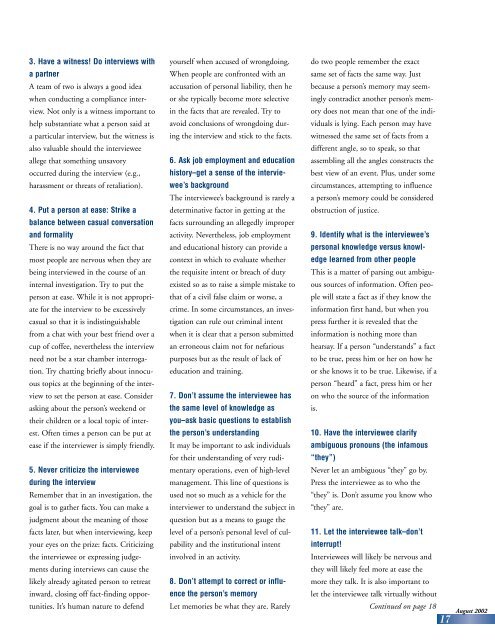JR - Health Care Compliance Association
JR - Health Care Compliance Association
JR - Health Care Compliance Association
You also want an ePaper? Increase the reach of your titles
YUMPU automatically turns print PDFs into web optimized ePapers that Google loves.
3. Have a witness! Do interviews with<br />
yourself when accused of wrongdoing.<br />
do two people remember the exact<br />
a partner<br />
When people are confronted with an<br />
same set of facts the same way. Just<br />
A team of two is always a good idea<br />
accusation of personal liability, then he<br />
because a person’s memory may seem-<br />
when conducting a compliance inter-<br />
or she typically become more selective<br />
ingly contradict another person’s mem-<br />
view. Not only is a witness important to<br />
in the facts that are revealed. Try to<br />
ory does not mean that one of the indi-<br />
help substantiate what a person said at<br />
avoid conclusions of wrongdoing dur-<br />
viduals is lying. Each person may have<br />
a particular interview, but the witness is<br />
ing the interview and stick to the facts.<br />
witnessed the same set of facts from a<br />
also valuable should the interviewee<br />
different angle, so to speak, so that<br />
allege that something unsavory<br />
6. Ask job employment and education<br />
assembling all the angles constructs the<br />
occurred during the interview (e.g.,<br />
history–get a sense of the intervie-<br />
best view of an event. Plus, under some<br />
harassment or threats of retaliation).<br />
wee’s background<br />
circumstances, attempting to influence<br />
The interviewee’s background is rarely a<br />
a person’s memory could be considered<br />
4. Put a person at ease: Strike a<br />
determinative factor in getting at the<br />
obstruction of justice.<br />
balance between casual conversation<br />
facts surrounding an allegedly improper<br />
and formality<br />
activity. Nevertheless, job employment<br />
9. Identify what is the interviewee’s<br />
There is no way around the fact that<br />
and educational history can provide a<br />
personal knowledge versus knowl-<br />
most people are nervous when they are<br />
context in which to evaluate whether<br />
edge learned from other people<br />
being interviewed in the course of an<br />
the requisite intent or breach of duty<br />
This is a matter of parsing out ambigu-<br />
internal investigation. Try to put the<br />
existed so as to raise a simple mistake to<br />
ous sources of information. Often peo-<br />
person at ease. While it is not appropri-<br />
that of a civil false claim or worse, a<br />
ple will state a fact as if they know the<br />
ate for the interview to be excessively<br />
crime. In some circumstances, an inves-<br />
information first hand, but when you<br />
casual so that it is indistinguishable<br />
tigation can rule out criminal intent<br />
press further it is revealed that the<br />
from a chat with your best friend over a<br />
when it is clear that a person submitted<br />
information is nothing more than<br />
cup of coffee, nevertheless the interview<br />
an erroneous claim not for nefarious<br />
hearsay. If a person “understands” a fact<br />
need not be a star chamber interroga-<br />
purposes but as the result of lack of<br />
to be true, press him or her on how he<br />
tion. Try chatting briefly about innocu-<br />
education and training.<br />
or she knows it to be true. Likewise, if a<br />
ous topics at the beginning of the inter-<br />
person “heard” a fact, press him or her<br />
view to set the person at ease. Consider<br />
7. Don’t assume the interviewee has<br />
on who the source of the information<br />
asking about the person’s weekend or<br />
the same level of knowledge as<br />
is.<br />
their children or a local topic of inter-<br />
you–ask basic questions to establish<br />
est. Often times a person can be put at<br />
the person’s understanding<br />
10. Have the interviewee clarify<br />
ease if the interviewer is simply friendly.<br />
It may be important to ask individuals<br />
ambiguous pronouns (the infamous<br />
for their understanding of very rudi-<br />
“they”)<br />
5. Never criticize the interviewee<br />
mentary operations, even of high-level<br />
Never let an ambiguous “they” go by.<br />
during the interview<br />
management. This line of questions is<br />
Press the interviewee as to who the<br />
Remember that in an investigation, the<br />
used not so much as a vehicle for the<br />
“they” is. Don’t assume you know who<br />
goal is to gather facts. You can make a<br />
interviewer to understand the subject in<br />
“they” are.<br />
judgment about the meaning of those<br />
question but as a means to gauge the<br />
facts later, but when interviewing, keep<br />
level of a person’s personal level of cul-<br />
11. Let the interviewee talk–don’t<br />
your eyes on the prize: facts. Criticizing<br />
pability and the institutional intent<br />
interrupt!<br />
the interviewee or expressing judge-<br />
involved in an activity.<br />
Interviewees will likely be nervous and<br />
ments during interviews can cause the<br />
they will likely feel more at ease the<br />
likely already agitated person to retreat<br />
8. Don’t attempt to correct or influ-<br />
more they talk. It is also important to<br />
inward, closing off fact-finding oppor-<br />
ence the person’s memory<br />
let the interviewee talk virtually without<br />
tunities. It’s human nature to defend<br />
Let memories be what they are. Rarely<br />
Continued on page 18<br />
17<br />
August 2002

















